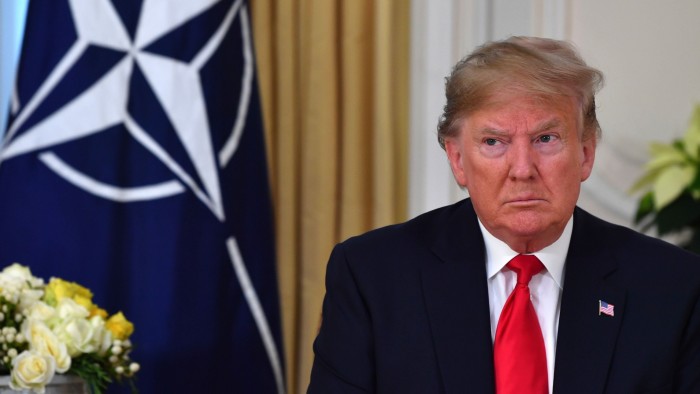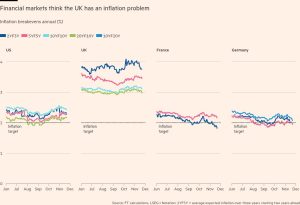Where Trump could surprise on the upside

Unlock the White House Watch newsletter for free
Your guide to what the 2024 US election means for Washington and the world
Fascist leaders tend to lust after other countries’ territory. By that measure Donald Trump is not a fascist. One of his most enduring appeals to the Maga base has been his rhetoric against America’s so-called forever wars. Put simply, Trump loves trade wars but is generally scornful of military ones. It was thus odd that Kamala Harris chose to appear more often in the campaign with Liz Cheney — daughter of Dick Cheney, co-author of the Iraq war, and herself a hardliner — than with Shawn Fain, head of the United Auto Workers union. Trump had a better gauge of America’s mood. But the price of America’s decision will mostly be paid at home.
History may well record November 5 2024 as the day America repudiated the postwar world that it built. Yet it was a long time coming. The twin peaks of America’s unipolar moment were China’s admission to the World Trade Organization in 2001 and the 2003 invasion of Iraq. Both were enduringly unpopular with Americans. At some point a political entrepreneur was going to reap that disenchantment. It could have been Bernie Sanders, who twice finished a strong second in the Democratic primaries. That the beneficiary was instead someone who admires authoritarianism poses acute danger at home but not necessarily abroad.
Trump is no champion of global rules, human rights or democracy. He sees the world as a jungle in which ethics are irrelevant. But his transactional approach to everything — from his three marriages to US-China relations — could produce surprises. The most obvious is in the Middle East. The least unrealistic hope of bringing some kind of reprieve to the Israeli-Palestinian tragedy is to persuade Saudi Arabia to recognise Israel. Saudi Arabia’s price for joining the Abraham Accords would be far higher today than it was before the Hamas slaughter on October 7 2023.
Yet prospects of a Saudi deal may be the biggest reason for Israel to think twice about annexing Gaza and the occupied West Bank with the mass expulsion of Palestinians — a spectre that cannot be ruled out. Trump would have no moral objections to a brutal endgame. But the Saudi route would yield tempting business opportunities in which Riyadh would buy some kind of Palestinian autonomy with pledges to lead the Gaza reconstruction. The affinity between the House of Saud and the House of Trump goes far beyond their love of bling.
Trump’s victory was welcomed in much of the Gulf, India, Hungary, Turkey, Israel and parts of the global south. It was most dreaded by Volodymyr Zelenskyy’s government in Kyiv. But the odds that Harris could have squeezed much more Ukraine funding out of Congress would have been slim. In either outcome, 2025 has for many months been seen as a window for Washington to push some kind of a ceasefire in Ukraine. Given Russia’s military advance, it is by no means clear that Putin wants to stop fighting.
Trump could go either way. He might offer to lift sanctions on Russia in exchange for freezing the current map. Or he could “escalate to de-escalate” and give Putin a reason to make concessions. Unlike Biden, Trump is unpredictable. That means things could go horribly wrong — such as the US abandonment of Ukraine and Zelenskyy’s exit. Or they could yield the unexpected: Putin might see benefit in deepening his ties with Trump by offering a better deal. The strongman and the budding strongman share a mutual disdain for the “liberal international order”.
Either way, Trump’s victory is a clarifying moment for Europe. It is safe to say that Europe feels more urgency after his election than it would have done with Harris. Higher military spending and a drive to build a European defence industrial base could be a side benefit of Trump 2.0. It is far harder to anticipate where Trump will take US-China relations. Much as he wanted to ban TikTok before doing a U-turn, Trump’s China stance is subject to abrupt change. A full-blown trade war could trigger something hotter in the South China Sea. Or he could leverage China’s economic malaise to strike an optically attractive bargain with Xi Jinping.
On all these debates Trump will be surrounded by America Firsters, such as his deputy, JD Vance, and more conventional Republicans, like Marco Rubio, his nominee for secretary of state. For the media this promises another field day of leaks about internal feuds. What Trump most cares about, however, is hounding his “enemy from within” — and he means it. The future of Ukraine, Taiwan, Gaza and elsewhere is not what sets Trump’s pulse racing. His ethical void presents opportunity as well as danger.
#Trump #surprise #upside




